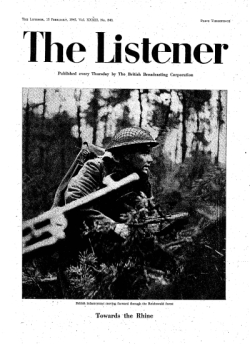The Listener, 15 February, 1945. Vol. XXXIII. No. 840 (p. 185) [.pdf]
Poetry in War Time
The literary critic must concern himself more with the achievement of poets than with their renown, and the popularity or otherwise of the poets I wrote about is not my business. It is always deplorable that poets who are gifted, sincere and hard-working should be ignored or disparaged merely because their work is not always easy to grasp; but it will, I think, be a long time before one can hope for a disappearance of that traditional attitude which finds expression in the satirical second paragraph of Mr. Richards' letter: 'If we admit that people, however they may respect contemporary poets, do not quote them, then what Mr. Reed means by poetry and what it means to the homme moyen esthétique are two entirely different and distinct things'. Between the protasis and the apodosis of this statement there is no obvious connection; but I sense from the tone what Mr. Richards believes: that modern poetry—probably all of it—is obscure, impenetrable, esoteric, and unlovely. I do not agree with him: we can merely state our tastes. But if by the homme moyen esthétique he means the average man who takes an interest in art—the man who, for example, takes the trouble to go to W.E.A. classes, or to read regularly and seriously by himself—then I know that he very much underestimates that man's tolerance, patience and curiosity. Mr. Richards lacks these qualities, and is wrong to put himself beside the homme moyen esthétique. He is the homme moyen philistin; and he is proud of it.
It is more profitable to discuss Mr. Richards' first paragraph. He is right in assuming that Rupert Brooke achieved far greater popularity than any poet of today. This was not, however, due to any particular poetic merit; Brooke's talents were, in fact, of the slightest. He achieved his unparalleled popularity, I believe, simply because he contrived at an appropriate moment to falsify the nature of war in a way that the public found palatable. He himself is not to be blamed for this; had he lived, he might have regretted his five war-sonnets (and had he lived, he would probably never have been so famous). For they show a defect of imagination which in a poet is serious to the point of catastrophe. And Brooke saw very little of the war itself, and nothing at all of the long-term horror which might have filled the gap his imagination failed to fill. He wrote in enthusiastic ignorance; death in battle appeared lovely; there was no suggestion that war might be a tragedy. This was all highly consolatory to those whose task it was to keep the home fires burning. He was a poet for the thoughtless; and there is no fundamental difference between his war-poetry and the present-day song beginning 'There'll always be an England'.
The poets who saw what war was really like, who saw it for a long time, and who unflinchingly described it—Owen and Sassoon, for example—did not fare so well, either during or after the war. It is alongside them that I would put the best war-poets of today: such poets as Lewis and Keyes. And though they may not be widely quoted—whatever that is worth (and it may be remembered that Housman is easier to quote than Milton)—their success with the general public is a hopeful sign that people are able to 'take' a little more in the way of honesty than they used to be. It is worth while adding that Lewis's Raiders' Dawn sold well, even before Lewis's death. But neither of them has had the freakish success of Rupert Brooke or Julian Grenfell; nor would they have hoped for it.
Mr. Grigson is right in assuming that I have not read Mr. Auden's new book, which has not yet been published over here. No one could look forward to it with more eagerness than I do: I hope it is as good as Mr. Grigson says; if it is, it will survive Mr. Grigson's praise.
BletchleyHenry Reed








